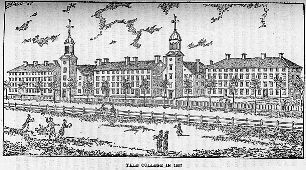James Fenimore Cooper
III. JAMES FENIMORE COOPER: 1789-1851.
While the genius of Irving was winning for a newly developed American literature the recognition and respect of our kinsmen in England, his contemporary, James Fenimore Cooper, suddenly appeared in the field of letters to share in the distinction and the honor of widely recognized literary success. Our first notable writer of fiction, Cooper was in no sense a follower of the first American romancer, Charles Brockden Brown, nor an imitator of his fantastic and abnormal types. He stands rather as the originator of the novel of adventure in our literature, and is frequently termed "the American Scott."
It is remarkable that many of the best English novelists have begun their careers as professional storytellers almost by accident. This is true of Richardson and Fielding, the fathers of the modern novel, as it was of their great forerunner, Defoe. Walter Scott was driven to romancing in prose when Lord Byron invaded so successfully his chosen field of metrical romance, Dickens and Thackeray stumbled into fiction through the hedgerows of journalism. George Eliot had found a place for herself in letters before her talent for character creation was discovered. Cooper's experience was somewhat similar to that of Fielding; for the author of Joseph Andrews was provoked into novel writing by his impatience at the tediousness and unnaturalness of Richardson's Pamela, and our first American novelist of genius started upon his earliest venture to prove to his wife that he could write a better story than one that by chance he was trying to read. The secret of Cooper's success is the same as that of these others; given the innate talent for narration, and the born story-teller will -- whatever and whenever the exciting cause of his activity -- in the fullness of time come to his own.
Cooperstown.
James Fenimore Cooper was born in Burlington, New Jersey, September 15, 1789; but before he was quite one year old his father removed his family to a most romantic homestead on the shore of Otsego Lake in central New York. It was the frontier of civilization in that day, and on the very edge of the interminable forest that stretched out over the western wilderness. The deer, the wolf, the wildcat, and the bear were familiar denizens of the still savage woods. The tribes of the Six Nations still held their pow-wows and followed the warpath beneath its shade. The lonely cabins of more venturesome settlers were still exposed to the horrors of Indian attacks. The little village of Cooperstown itself exhibited all the various phases of pioneer life and character. Amid these scenes and in this vigorous atmosphere the childhood of Cooper was passed. It is no wonder that the impressions of these early years should remain vividly painted on his memory to give realistic coloring to the picturesque tales of pioneer life which were later to be written.
On Shipboard.
A second period of unconscious preparation came when, in 1806, having got himself expelled from Yale
College through some outbreak of youthful folly in his junior year, he signed articles on board the merchant
ship Sterling, and entered upon a regular apprenticeship before the mast. A year later, he secured a
commission as midshipman in the United States Navy, and for three years followed the service on the
Atlantic and the Lakes. In 1809, he was in command of the gunboats on Lake Champlain. Cooper resigned
from the Navy in 1811, but his experiences on shipboard had made him master of material which he
afterward used in two or three as admirable sea tales as ever were written. 
The Experiment.
James Fenimore Cooper was thirty years old when he began to write. He was then living in Westchester County, not far from the city of New York, on what was known as the Angevine Farm, a beautifully situated estate commanding an extended view of the Sound. His resignation from the Navy nine years before had been coincident with his marriage to a Miss De Lancey, whose father during the Revolutionary War had supported the cause of the Crown. Cooper himself had not settled down to any definite vocation -- least of all had any thought of a literary career entered his head. The occasion which led to the writing of his first novel has been mentioned. "I believe I could write a better story myself," he said, laying down
| Previous chapter | Back | Home | Email this | Search | Discuss | Bookmark | Next chapter/page |
See our FAQ for more details.